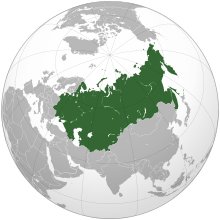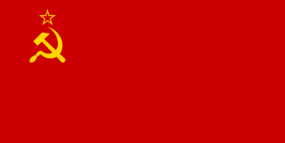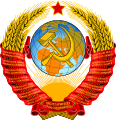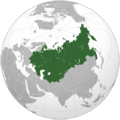Index of Soviet Union–related articles facts for kids
Quick facts for kids
Union of Soviet Socialist Republics
Союз Советских Социалистических Республик
Soyuz Sovetskikh Sotsialisticheskikh Respublik |
|||||||||||||||||||||||||||||||||||||||||||||||||||||||||||||||||
|---|---|---|---|---|---|---|---|---|---|---|---|---|---|---|---|---|---|---|---|---|---|---|---|---|---|---|---|---|---|---|---|---|---|---|---|---|---|---|---|---|---|---|---|---|---|---|---|---|---|---|---|---|---|---|---|---|---|---|---|---|---|---|---|---|---|
| 1922–1991 | |||||||||||||||||||||||||||||||||||||||||||||||||||||||||||||||||
|
Flag of the Soviet Union
(1936–1955) State emblem
(1956–1991) |
|||||||||||||||||||||||||||||||||||||||||||||||||||||||||||||||||
|
Motto:
"Пролетарии всех стран, соединяйтесь!" Proletarii vsekh stran, soyedinyaytes'! ("Workers of the world, unite!") |
|||||||||||||||||||||||||||||||||||||||||||||||||||||||||||||||||
|
Anthem:
"Интернационал" Internatsional ("The Internationale") (1922–1944) "Государственный гимн СССР" Gosudarstvennyy gimn SSSR ("State Anthem of the USSR") (1944–1991) |
|||||||||||||||||||||||||||||||||||||||||||||||||||||||||||||||||

The Soviet Union from 1945 to 1991
|
|||||||||||||||||||||||||||||||||||||||||||||||||||||||||||||||||
| Capital | Moscow 55°45′N 37°37′E / 55.750°N 37.617°E |
||||||||||||||||||||||||||||||||||||||||||||||||||||||||||||||||
| Largest city | Capital | ||||||||||||||||||||||||||||||||||||||||||||||||||||||||||||||||
| Official languages | Russian | ||||||||||||||||||||||||||||||||||||||||||||||||||||||||||||||||
| Recognised regional languages | |||||||||||||||||||||||||||||||||||||||||||||||||||||||||||||||||
| Minority languages | |||||||||||||||||||||||||||||||||||||||||||||||||||||||||||||||||
| Ethnic groups
(1989)
|
|
||||||||||||||||||||||||||||||||||||||||||||||||||||||||||||||||
| Religion | Secular state State atheism |
||||||||||||||||||||||||||||||||||||||||||||||||||||||||||||||||
| Demonym(s) | Soviet | ||||||||||||||||||||||||||||||||||||||||||||||||||||||||||||||||
| Government |
|
||||||||||||||||||||||||||||||||||||||||||||||||||||||||||||||||
| Leader | |||||||||||||||||||||||||||||||||||||||||||||||||||||||||||||||||
|
• 1922–1924
|
Vladimir Lenin | ||||||||||||||||||||||||||||||||||||||||||||||||||||||||||||||||
|
• 1924–1953
|
Joseph Stalin | ||||||||||||||||||||||||||||||||||||||||||||||||||||||||||||||||
|
• 1953
|
Georgy Malenkov | ||||||||||||||||||||||||||||||||||||||||||||||||||||||||||||||||
| Head of state | |||||||||||||||||||||||||||||||||||||||||||||||||||||||||||||||||
|
• 1922–1946 (first)
|
Mikhail Kalinin | ||||||||||||||||||||||||||||||||||||||||||||||||||||||||||||||||
|
• 1988–1991 (last)
|
Mikhail Gorbachev | ||||||||||||||||||||||||||||||||||||||||||||||||||||||||||||||||
| Head of government | |||||||||||||||||||||||||||||||||||||||||||||||||||||||||||||||||
|
• 1922–1924 (first)
|
Vladimir Lenin | ||||||||||||||||||||||||||||||||||||||||||||||||||||||||||||||||
|
• 1991 (last)
|
Ivan Silayev | ||||||||||||||||||||||||||||||||||||||||||||||||||||||||||||||||
| Legislature | Congress of Soviets (1922–1936) Supreme Soviet (1936–1991) |
||||||||||||||||||||||||||||||||||||||||||||||||||||||||||||||||
| Soviet of Nationalities | |||||||||||||||||||||||||||||||||||||||||||||||||||||||||||||||||
| Soviet of the Union | |||||||||||||||||||||||||||||||||||||||||||||||||||||||||||||||||
| History | |||||||||||||||||||||||||||||||||||||||||||||||||||||||||||||||||
| 7 November 1917 | |||||||||||||||||||||||||||||||||||||||||||||||||||||||||||||||||
|
• Established
|
30 December 1922 | ||||||||||||||||||||||||||||||||||||||||||||||||||||||||||||||||
|
• Civil War ended
|
16 June 1923 | ||||||||||||||||||||||||||||||||||||||||||||||||||||||||||||||||
|
• First constitution
|
31 January 1924 | ||||||||||||||||||||||||||||||||||||||||||||||||||||||||||||||||
|
• Second constitution
|
5 December 1936 | ||||||||||||||||||||||||||||||||||||||||||||||||||||||||||||||||
| 22 June 1941 | |||||||||||||||||||||||||||||||||||||||||||||||||||||||||||||||||
|
• Victory in World War II
|
9 May 1945 | ||||||||||||||||||||||||||||||||||||||||||||||||||||||||||||||||
| 25 February 1956 | |||||||||||||||||||||||||||||||||||||||||||||||||||||||||||||||||
|
• Last constitution
|
9 October 1977 | ||||||||||||||||||||||||||||||||||||||||||||||||||||||||||||||||
|
• First republic secedes
|
11 March 1990 | ||||||||||||||||||||||||||||||||||||||||||||||||||||||||||||||||
|
• Multi-party system
|
14 March 1990 | ||||||||||||||||||||||||||||||||||||||||||||||||||||||||||||||||
|
• August Coup
|
19–22 August 1991 | ||||||||||||||||||||||||||||||||||||||||||||||||||||||||||||||||
|
• Belovezha Accords
|
8 December 1991 | ||||||||||||||||||||||||||||||||||||||||||||||||||||||||||||||||
| 26 December 1991 | |||||||||||||||||||||||||||||||||||||||||||||||||||||||||||||||||
| Area | |||||||||||||||||||||||||||||||||||||||||||||||||||||||||||||||||
|
• Total
|
22,402,200 km2 (8,649,500 sq mi) | ||||||||||||||||||||||||||||||||||||||||||||||||||||||||||||||||
| Population | |||||||||||||||||||||||||||||||||||||||||||||||||||||||||||||||||
|
• 1989 census
|
|||||||||||||||||||||||||||||||||||||||||||||||||||||||||||||||||
|
• Density
|
12.7/km2 (32.9/sq mi) | ||||||||||||||||||||||||||||||||||||||||||||||||||||||||||||||||
| GDP (PPP) | 1990 estimate | ||||||||||||||||||||||||||||||||||||||||||||||||||||||||||||||||
|
• Total
|
$2.7 trillion (2nd) | ||||||||||||||||||||||||||||||||||||||||||||||||||||||||||||||||
|
• Per capita
|
$9,000 | ||||||||||||||||||||||||||||||||||||||||||||||||||||||||||||||||
| GDP (nominal) | 1990 estimate | ||||||||||||||||||||||||||||||||||||||||||||||||||||||||||||||||
|
• Total
|
$2.7 trillion (2nd) | ||||||||||||||||||||||||||||||||||||||||||||||||||||||||||||||||
|
• Per capita
|
$9,000 (28th) | ||||||||||||||||||||||||||||||||||||||||||||||||||||||||||||||||
| Gini (1989) | 0.275 low |
||||||||||||||||||||||||||||||||||||||||||||||||||||||||||||||||
| HDI (1990) | 0.920 very high |
||||||||||||||||||||||||||||||||||||||||||||||||||||||||||||||||
| Currency | Soviet ruble (руб) (SUR) | ||||||||||||||||||||||||||||||||||||||||||||||||||||||||||||||||
| Time zone | (UTC+2 to +12) | ||||||||||||||||||||||||||||||||||||||||||||||||||||||||||||||||
| Date format | dd-mm-yyyy | ||||||||||||||||||||||||||||||||||||||||||||||||||||||||||||||||
| Driving side | right | ||||||||||||||||||||||||||||||||||||||||||||||||||||||||||||||||
| Calling code | +7 | ||||||||||||||||||||||||||||||||||||||||||||||||||||||||||||||||
| ISO 3166 code | SU | ||||||||||||||||||||||||||||||||||||||||||||||||||||||||||||||||
| Internet TLD | .su | ||||||||||||||||||||||||||||||||||||||||||||||||||||||||||||||||
|
|||||||||||||||||||||||||||||||||||||||||||||||||||||||||||||||||
|
Notes
|
|||||||||||||||||||||||||||||||||||||||||||||||||||||||||||||||||
The Soviet Union was a huge country that existed from 1922 to 1991. It was officially called the Union of Soviet Socialist Republics (USSR). It covered a large part of Eastern Europe and Asia. Its capital city was Moscow. The Soviet Union was a socialist state with a one-party system, meaning only one political party, the Communist Party of the Soviet Union, was in charge.
The Soviet Union was formed after the Russian Revolution and a civil war. It grew to include 15 different republics. These included Russia, Ukraine, Belarus, and many others. The country was known for its unique political and economic system. It also played a major role in world events, especially during World War II and the Cold War.
Contents
The Beginning: How the Soviet Union Formed
The Soviet Union was created on December 30, 1922. This happened after the Russian Revolution of 1917. The revolution led to the end of the Russian Empire. A group called the Bolsheviks, led by Vladimir Lenin, took power. They wanted to create a society based on communism.
After a difficult Russian Civil War, several smaller republics joined together. They signed the Treaty on the Creation of the USSR. This treaty officially formed the Soviet Union. Lenin was its first leader.
Early Years and New Economic Policy
In its early years, the Soviet Union faced many challenges. The civil war had caused a lot of damage. To help the economy, Lenin introduced the New Economic Policy (NEP). This policy allowed some private businesses. It helped the country recover.
Lenin passed away in 1924. After his death, there was a power struggle. Joseph Stalin eventually became the new leader. He changed many of the policies.
Life Under Joseph Stalin
Joseph Stalin became the leader of the Soviet Union in 1924. He ruled until his death in 1953. This period is often called the Stalin era. Stalin wanted to quickly industrialize the country. He also wanted to collectivize farming.
Building Industry and Collective Farms
Stalin introduced Five-Year Plans. These plans set big goals for industry and agriculture. Factories were built quickly. The country became a major industrial power.
Farms were also changed. Small, private farms were combined into large collective farms. This was called collectivization. Farmers had to work together on these state-controlled farms. This was a big change for many people.
World War II: The Great Patriotic War
The Soviet Union played a huge part in World War II. They called it the Great Patriotic War. In 1941, Nazi Germany attacked the Soviet Union. This was a surprise attack called Operation Barbarossa.
The war was very harsh. Many Soviet citizens died. But the Soviet army fought bravely. They pushed back the German forces. The Soviet Union's victory in 1945 was a turning point in the war. It helped defeat Nazi Germany.
The Cold War and Beyond
After World War II, the Soviet Union became one of the world's two superpowers. The other was the United States. This led to a period known as the Cold War. It was a time of tension and competition. There was no direct fighting between the two superpowers.
New Leaders and Space Race
After Stalin's death in 1953, Nikita Khrushchev became the leader. He tried to make some changes. This period is known as De-Stalinization. Khrushchev also focused on the Space Race.
The Soviet Union was the first to send a satellite, Sputnik 1, into space in 1957. They also sent the first human, Yuri Gagarin, into space in 1961. This showed the world their scientific progress.
Later leaders included Leonid Brezhnev, Yuri Andropov, and Konstantin Chernenko. During Brezhnev's time, the Soviet Union had a period of stability. But there were also some economic challenges.
Glasnost and Perestroika
In 1985, Mikhail Gorbachev became the last leader of the Soviet Union. He introduced two major reforms: Glasnost (openness) and Perestroika (restructuring).
- Glasnost meant more freedom of speech and information. People could talk more openly about problems.
- Perestroika aimed to reform the economy. It tried to make the Soviet system more efficient.
These reforms were meant to strengthen the Soviet Union. But they also led to unexpected changes.
The End of the Soviet Union
Gorbachev's reforms led to more demands for change. People in the different republics wanted more independence. Some republics began to declare their freedom.
In August 1991, there was an attempt by some hardliners to take control. This was called the August Coup. But it failed. This event weakened the Soviet government even more.
On December 8, 1991, leaders from Russia, Ukraine, and Belarus signed the Belovezha Accords. This agreement declared that the Soviet Union no longer existed. On December 26, 1991, the Soviet Union was officially dissolved. The 15 republics became independent countries.
Images for kids
 | Bessie Coleman |
 | Spann Watson |
 | Jill E. Brown |
 | Sherman W. White |







